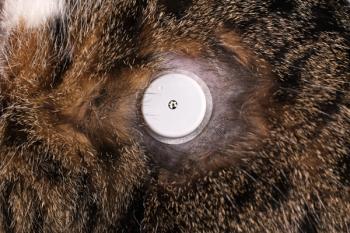
Presentation Recap: Questioning methimazole trials
From the 2011 ACVIM Forum: Is this measure necessary for a good outcome?
For years, conventional wisdom has been to perform a methimazole trial in cats in which hyperthyroidism has been newly diagnosed to evaluate the impact of a euthyroid state on renal function. In his presentation, "Treatment of hyperthyroidism and concurrent renal disease: Is the 'Tapazole trial' necessary?" Dr. Mark Peterson of the Animal Endocrine Clinic in New York questioned this practice, however, because instituting treatment of the thyroid condition is needed regardless of a patient's renal status.1
Hyperthyroidism itself has long-term deleterious effects on renal function, and research cited by Dr. Peterson has shown that the survival of cats that do develop azotemia after treatment for hyperthyroidism is no shorter than for those whose renal function remains stable.2 For those patients that do develop azotemia after their hyperthyroid state is corrected, the renal disease is not severe or life-threatening and usually stabilizes within the first month of therapy.3,4
This "Presentation Recap" summary from the 2011 American College of Veterinary Internal Medicine (ACVIM) Forum, which took place in Denver, Colo., was contributed by Jennifer L. Garcia, DVM, DACVIM, a veterinary internal medicine consultant in Houston, Texas.
REFERENCES
1. Peterson ME, Treatment of hyperthyroidism and concurrent renal disease: Is the "tapazole trial" necessary? Presented at the Annual Meeting of the American College of Veterinary Internal Medicine; June 2011.
2. Wakeling J, Rob C, Elliott J, et al. Survival of hyperthyroid cats is not affected by post-treatment azotemia (abst.) J Vet Intern Med 2006;20:1523.
3. Syme HM. Cardiovascular and renal manifestations of hyperthyroidism. Vet Clin North Am Small Anim Pract 2007;37(4):723-743.
4. Boag AK, Neiger R, Slater L, et al. Changes in the glomerular filtration rate of 27 cats with hyperthyroidism after treatment with radioactive iodine. Vet Rec 2007;161(21):711-715.
Newsletter
From exam room tips to practice management insights, get trusted veterinary news delivered straight to your inbox—subscribe to dvm360.




